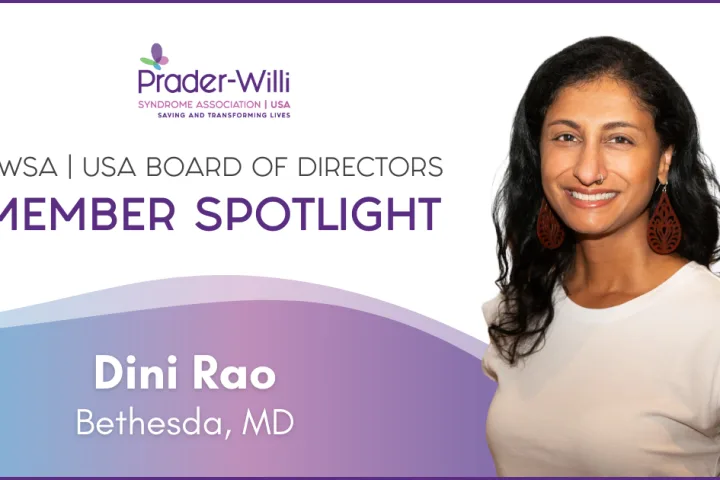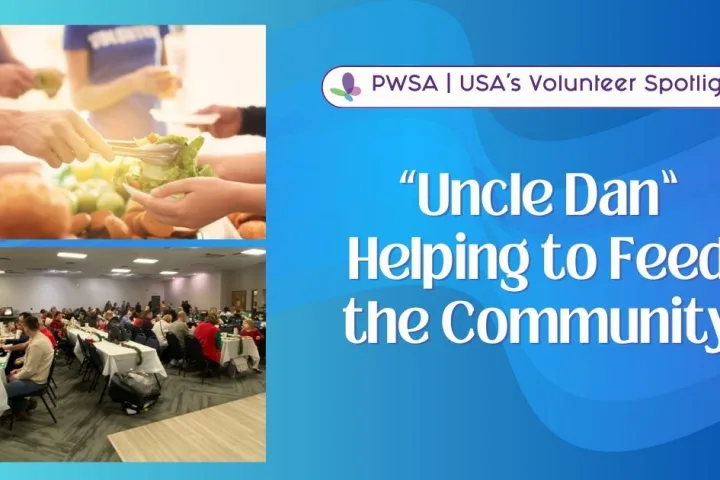Submitted by Anne Fricke, mom to Freya (13, living with PWS)
When I first learned about the hyperphagia aspect of PWS, I thought of my garden—the hours of sweat and love I have put into it, the ease of anxiety it offers me, and the delicious bounty my family receives from it. I was worried it would be a thing of the past.
My fears, thankfully, did not come to be. Not yet, anyway. Freya can easily help me in the garden without looking at the rows of plants as an instant buffet. And if she grabs the occasional cherry tomato while working, at least it’s organic. (The wild blackberry bushes along the walking path are another story, however.)
We have locks on our fridge for when we leave her alone at home or with her little sister for an extended period, but that is more for my peace of mind.
Freya gets anxious about meal times, especially if we’re traveling or the schedule is interrupted. We do have a lot of conversations around food. It’s annoying, but it feels manageable at the moment.
But though it’s manageable today, it does not mean it always will be so. Though it’s manageable for our family, I know there are other families who are struggling. Families who live with their food constantly locked and insatiable perseverations on meal time. Families who live in fear their loved one will elope to get food or fear they will eat whatever they find, edible or not. People we love who live with relentless pangs of hunger and overwhelming food anxiety.
When we received the news about VYKAT XR (formerly known as DCCR), after rushing to share the news with the PWS community, I thought of a man my friend once told me about. I had just learned that my baby had PWS, and she told me of the time she worked in a group home for adult men with disabilities. There was a resident with PWS. She told me how they had to hide the shampoos and soaps that smelled like fruit, lock the food, and secure the compost and the trash. At that moment, the diagnosis fresh on my tongue and burrowing into my heart, my precious baby in my arms, that life seemed unbearable. Of course, since then, I have repeatedly learned that we are great at adapting, and there is always joy to be found in life, even if sometimes you just have to look harder.
But now, the PWS community has cause for far more hope! Battles are raging outside, but this morning, as we sip our coffee and look to the future, we can perhaps breathe a little deeper, release some of that tension in our shoulders, and revel in the sweet calm of victory.
There will be more to come—more fighting for access and insurance coverage, bureaucratic red tape, and frustrations. But we’ve been there before, and we know we can do this. Plenty of work exists, but we’re here for it. That glow on the horizon just got a whole lot brighter.
Learn more about the new FDA approved treatment, VYKAT XR, at PWS Breaking News! FDA Approves First-Ever Treatment for Hyperphagia in PWS – Prader-Willi Syndrome Association | USA
Share this!





 Perry A. Zirkel has written more than 1,500 publications on various aspects of school law, with an emphasis on legal issues in special education. He writes a regular column for NAESP’s Principal magazine and NASP’s Communiqué newsletter, and he did so previously for Phi Delta Kappan and Teaching Exceptional Children.
Perry A. Zirkel has written more than 1,500 publications on various aspects of school law, with an emphasis on legal issues in special education. He writes a regular column for NAESP’s Principal magazine and NASP’s Communiqué newsletter, and he did so previously for Phi Delta Kappan and Teaching Exceptional Children. Jennifer Bolander has been serving as a Special Education Specialist for PWSA (USA) since October of 2015. She is a graduate of John Carroll University and lives in Ohio with her husband Brad and daughters Kate (17), and Sophia (13) who was born with PWS.
Jennifer Bolander has been serving as a Special Education Specialist for PWSA (USA) since October of 2015. She is a graduate of John Carroll University and lives in Ohio with her husband Brad and daughters Kate (17), and Sophia (13) who was born with PWS. Dr. Amy McTighe is the PWS Program Manager and Inpatient Teacher at the Center for Prader-Willi Syndrome at the Children’s Institute of Pittsburgh. She graduated from Duquesne University receiving her Bachelor’s and Master’s degree in Education with a focus on elementary education, special education, and language arts.
Dr. Amy McTighe is the PWS Program Manager and Inpatient Teacher at the Center for Prader-Willi Syndrome at the Children’s Institute of Pittsburgh. She graduated from Duquesne University receiving her Bachelor’s and Master’s degree in Education with a focus on elementary education, special education, and language arts. Evan has worked with the Prader-Willi Syndrome Association (USA) since 2007 primarily as a Crisis Intervention and Family Support Counselor. Evans works with parents and schools to foster strong collaborative relationships and appropriate educational environments for students with PWS.
Evan has worked with the Prader-Willi Syndrome Association (USA) since 2007 primarily as a Crisis Intervention and Family Support Counselor. Evans works with parents and schools to foster strong collaborative relationships and appropriate educational environments for students with PWS. Staci Zimmerman works for Prader-Willi Syndrome Association of Colorado as an Individualized Education Program (IEP) consultant. Staci collaborates with the PWS multi-disciplinary clinic at the Children’s Hospital in Denver supporting families and school districts around the United States with their child’s Individual Educational Plan.
Staci Zimmerman works for Prader-Willi Syndrome Association of Colorado as an Individualized Education Program (IEP) consultant. Staci collaborates with the PWS multi-disciplinary clinic at the Children’s Hospital in Denver supporting families and school districts around the United States with their child’s Individual Educational Plan. Founded in 2001, SDLC is a non-profit legal services organization dedicated to protecting and advancing the legal rights of people with disabilities throughout the South. It partners with the Southern Poverty Law Center, Protection and Advocacy (P&A) programs, Legal Services Corporations (LSC) and disability organizations on major, systemic disability rights issues involving the Individuals with Disabilities Education Act (IDEA), Americans with Disabilities Act (ADA), and the federal Medicaid Act. Recently in November 2014, Jim retired.
Founded in 2001, SDLC is a non-profit legal services organization dedicated to protecting and advancing the legal rights of people with disabilities throughout the South. It partners with the Southern Poverty Law Center, Protection and Advocacy (P&A) programs, Legal Services Corporations (LSC) and disability organizations on major, systemic disability rights issues involving the Individuals with Disabilities Education Act (IDEA), Americans with Disabilities Act (ADA), and the federal Medicaid Act. Recently in November 2014, Jim retired.